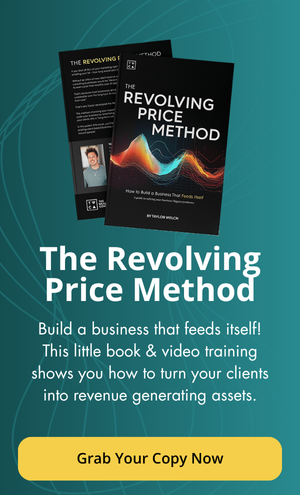
Quick Word Before You Dive In
This article was actually pulled directly from the personal blog of our CEO and owner, Taylor Welch. The entire article, along with dozens of other valuable resources can be found on his website taylorawelch.com. If you love personal growth, mind work, reprogramming, and development, it is well worth your time to check it out. With that being said – please enjoy!
Passion is Overrated – Here’s Why
Finding your “passion” is not predictable. I wouldn’t waste your time on it.
Passion is a lagging indicator. Lagging indicators are byproducts. In 1975 Baruch Fischoff showed that when people are asked to recall their predictions of an event (after learning the outcome) they overestimate their prior certainty about whether it would happen.
This bias leads people to prioritize retrospective data over predictive signals.
When you see people talking to you about how they just “found their passion” and then went “all in,” you’re seeing this bias at work. They have the order wrong. They’re using retrospective data to make a predictive forecast — and it’s silly.
I don’t mean to come down hard on anybody, I just think that people easily forget how difficult it is to “predict” what you’re going to be passionate about.

Passion is a Byproduct… Not a Pursuit
People don’t find their passion and then go all in. They go all in and then they find their passion. It’s less romantic than the movies lead you to believe, but it’s the way the real world works.
What produces passion?
- Mastery
- Effort
- Competence
- Learning
- Sacrifice
These things stack up and create weight that is hard for your mind to ignore. And the things we can’t easily ignore, we begin to fall in love with. Edward Deci and Richard Ryan proposed in 1985 that “intrinsic motivation” is driven by autonomy, competence, and relatedness. This became known as the “Self-Determination” theory and it is largely validated as a psychological model for motivation.
In short, you will want to do the things that you have sacrificed to learn how to do. Sounds like passion to me — and passion trails effort (not the other way around).
These things all have one thing in common: MASTERY.
Mastery is What Matters
Robert Greene, author of the book “Mastery” defines it as the highest level of achievement in any field, where deep knowledge, skill, and creativity come together. He puts it into three phases:
- Apprenticeship (learning from mentors)
- Creative-active (experiment and combine knowledge)
- Mastery (create new rules)
All the greats in history prove that passion is a byproduct of training and engagement. Andrew Carnegie didn’t care about steel. Henry Ford didn’t care about automobiles. John Rockefeller didn’t care about oil.
And if you really study Elon Musk, he doesn’t care that much about cars. He wants to get to space, and developing Tesla is just a way to get closer to that goal.
In my line of work there are a lot of people, business owners & consultants who are too interested in finding work they love. That’s a bit of a problem. Must entrepreneurs are living life backwards. Take me for example…
- I didn’t care that much about copywriting, until I got good at it
- I didn’t know what marketing was (I don’t have a university degree in marketing), but I got good at it, then better and better; eventually I fell in love with it because I became dominant
- Consulting wasn’t on my radar — until it was
- I didn’t want to do YouTube, now I like it because I’m good at it
- I didn’t have a passion for finance and trading — now I do…
I like these things because I have paid such a high price to develop mastery.
Writing is another example. Reading is another example.
The “Rules” Your Brain Creates (If You Let It)
This weekend my wife and I are taking a small 3-day vacation. I asked her what she wanted to do while we are away, and she said it would be fun for us to sit together and read then go out for dinner.
To anybody else, this might sound boring. But we’ve developed a love for learning. We weren’t born this way, it was developed. She runs her business and is an entrepreneur — and has concerted her ability to learn with her ability to grow something great.
Over time, your brain begins developing “rules” that govern what it likes. This almost always follows periods of effort. You start getting dopamine in proportion to your commitment to the outcome of follow through.
In 16th-century Japan, Nakamura Tokichi began an apprenticeship as a swordsmith. He didn’t want to, it was a begrudging decision as his family pushed him into the trade. Despite his lack of interest, Tokichi poured his effort into mastering the craft. His skill started to pay off, and he started feeling passion for it. He became an advocate for preserving Japanese swordsmith as an art. Later in life he writes:
“A dull blade finds no edge, and a man’s soul finds no purpose without effort.” — Nakamura Tokichi
Joseph Campbell (1904-1987) was an American professor, writer and mythologist. His most famous book was The Hero With a Thousand Faces. George Lucas credits Campbell for his inspiration for the story “Star Wars.”
“We must be willing to let go of the life we planned so as to have the life that is waiting for us.” —Joseph Campbell
This explains it perfectly.
Your passion is on the other side of your effort in whatever direction you choose to go. There will be work that you hate and work that you love. These are going to be categorized uniquely into the buckets that you have put the most effort into.

